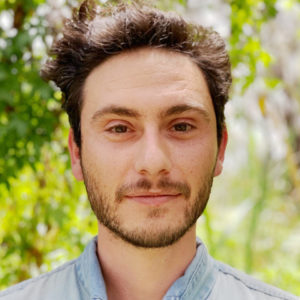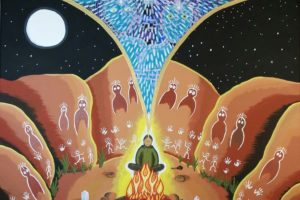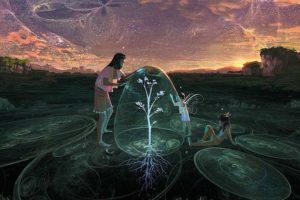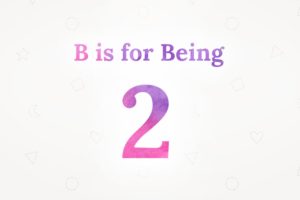Navigating through common difficulties encountered on the creative path.

Luna is a poet and multidisciplinary artist who has worked across the fields of theater, puppetry, design, film and even circus. This little list only covers a portion of her creative experiences.
From an early age she was expressing complex emotions, like the emotion of confusion, using water colour paints.
She is no stranger to the creative journey and the different challenges and obstacles which can arise along the way.
We sat down and talked about finding the balance between self-time and social-time, how to manage the expectations we we bring to our own creative process, and some of the ways we can make space for our unique creative voice to come through.
This is Part 1 of my talk with Luna. Stay tuned for Part 2 which will be up next week.
Highlights and Takeaways
- It’s a challenge trying to maintain the integrity of your own creative voice and market yourself at the same time.
- Making time to not do anything allows our minds to empty and provides the space for our creative voice to come to the surface.
- Creating space for yourself and maintaining social connections is a balancing act. Tuning into ourselves and asking, what do I need right now? Time with myself or time with others? ensures that we are filling ourselves with what we need in that moment.
- When we know the things which nourish and feed us creatively it becomes easier to say no to things because we know what we are saying yes to.
- If you’re going to be weird be the best weird you can be.
Show Notes
- [09:56] Luna: People are innately creative. We are all working with different frequencies – much like tuning a radio. I might go and see a wonderful show with a friend and what I see is vocalised experimental performance and the power of colours clashing together and becoming words; and what she sees is gesture and motif and symbol through movement. From the same performance our creative muse works through us in completely different ways.
The Expectations We Place on Our Creativity [12:40]
- Ben: Whenever I took my interests seriously (trying to take it to the next level) I would often find myself getting really serious about it and put all this pressure on myself to produce something amazing to make people go, “wow!”
- Luna: We have this preconceived idea of what we should be doing. It’s easy to get caught up in the shoulds; “I should be performing here, I should be publishing there, I should be working with these people.” Everyone goes through those phases no matter what it is they have achieved so far.
- These shoulds run completely counter intuitively to the natural flow of creativity. The shoulds are coming from the head and completely divorced from the heart.
- I feel that we’ve become very driven by the sense of a marketplace. I watch a lot of artists who put themselves under a lot of pressure to market themselves and a lot of business ethics has has worked its way down into art: how are you promoting yourself?, who are you networked with? where are you sharing your work? as apposed with, what are you feeling? and are you sharing it?
- We’re curating ourselves all the time on social media and it becomes very hard to give yourself the space to go through the creative process (to just let it flow).
- Ben: It’s quite a delicate balance to stay true to the creative voice and market yourself at the same time.
- Luna: You can’t completely separate yourself from the marketing aspect. It’s beneficial to be able to talk about your work and connect with potential collaborators.
- You have to stay in tune with the integrity of the creative process and have the ability to listen to what’s coming through and make the space for it.
- Creating the space and maintaining the integrity of your creative voice and at the same time having to generate the physical opportunities to exhibit that creativity; it’s very challenging.
- I know artists who are not engaged in the arts industry at all. They’re completely in their own space just being artists. What they are making is incredible but they are reducing the number of people who are engaged with that art.
How Do You Listen to Your Creative Voice? [19:19]
- Luna: I create the space to be dreaming. Sometimes this means I need to create days where I’m not doing much; I create an opportunity for my brain to empty out.
- Keeping in touch with the way the creative voice is coming through in other people
- going to shows and gallery spaces,
- wandering around the city looking a graffiti.
- Sitting under a tree and meditating.
Have You Always Created the Space to Get in Touch With Your Creative Voice? [21:40]
- Ben: Some of the most successful people on the planet have a mindfulness practice. Tuning in and being with their present moment experience.
- Luna: The older I get and the faster the world goes the more I have to work at creating space for myself.
- It helps that in my head I have a different view of where I sit in relationship to the world. I feel that I don’t need to participate in everything all the time. I’ve given myself the permission to do that. That really helps because I don’t feel bad about not going to an event that everyone else is going to. If I don’t feel like going then I just don’t go.
- Ben: That’s quite a skill. I’ve struggled with that for the majority of my life and that only changed for me once I started creating the space where I could be with myself and began establishing a friendship with myself. My self-integrity became stronger because of that and I no longer felt I had to participate.
- Luna: It’s a balancing act. You can also isolate yourself if you say no to things all the time. Sometimes I have to consciously check-in with myself because I’m saying no to things which I actually want to do.
- It became easier as an adult when I became clear on where my value was coming from. Where does the richness and depth in life come from for me? What nourishes me? What feeds me?– Once I realised what fed me it was easier to say no to events because I realised what I was saying yes to with that no.
- Ben: I find the balance is always shifting between saying yes and no to social events. Sometimes, for weeks on end, I feel like an extrovert and I just want to go out and socialise with as many people as I can, and other times I want everyone to go away so I can just focus on this work and be with myself.
- Luna: People say, you need to fill the well but that means different things at different times. Which well do you need to fill now?
- We live in a time where we are receiving so much input.
It takes time and separation from all the input to hear your inner-voice.
- At the end of the day it’s the artists job to feel; to feel and express the things that other people aren’t conscious of.
- It takes courage to feel and express the highest highs and lowest lows of life.
Something That’s Helped Me Stay Grounded within My Experience of Life. [29:29]
- Ben: Life is not black and white.
- I feel more empowered and more grounded within myself to have my own experience of life when I realise it’s changing so fast that I can’t possibly keep up with it; I can’t possibly understand everything that’s happening in every given moment. When I realise this I just surrender to the fact that I can’t know everything; what I can know is what is happening right now. – This has helped me silence all of the input around me, all of the stuff on social media and other people’s opinions of what I should or shouldn’t do.
Ben: All I can do is be here now and listen to what feels right to me.
- Luna: The whole history of art and creation is all about people experiencing where they are and expressing it.
- Having access to information about We have access to information about everyone who ever was and all the things they ever did, and what order they did them in and who they did them with. I feel that’s a whole other area of external pressure to be conscious of.
- You can’t be where those people were, expressing what those people did in the way that they did. All you can do is be the thing that you are because that’s where the gold is.
- Each person is a different part of the universe experiencing itself in a different way. As a result of that you have to do all the things that you feel naturally inclined to do. That’s your job. You must be you, to your utmost degree. That is your sole function. You can’t look around too much and compare and try to navigate life based on the expectations you’ve formed from everything that’s going on around you.
- Everyone’s path is completely and utterly unique.
How Have You Come Into Your Uniqueness and Kept Returning to It? [33:22]
- Luna: I’ve always been very stubborn. When I was six or seven I decided that I was weird. I couldn’t figure out how I fit into anything around me and so the best thing to do was just be the most me I could be.
Luna: When I was 10–14 my mantra was: if you’re going to be weird be the best weird you can be.
- If I was going to go out the door in clothes that were going to make people stop in the street and say: “Holy sh*t, look what that girl is wearing!” then it better the greatest expression of the thing that I felt in my heart. So that I felt that I’d done done the best job that I could and feel confident in that. – This is the very best weird that I can possibly be, and I’m happy to be confident in that.
- I always had an agreement with myself about reflecting to myself externally how I felt about myself internally. I did this as a way of navigating back to myself when I felt like I was losing a grasp on where I was. If that happened, I would go back to how I was dressing, how I was wearing my hair or makeup, and I would rebuild from the outside in and create the world that I wanted to be in on top of my body; that would help me with cultivating the space inside.
- Overtime I’ve internalised who I am and no longer need to indicate externally how I feel internally. I don’t feel the pressure of that anymore because now I carry it inside of me all the time; it doesn’t matter to me whether people can see it or not.
- I was going through a phase of expectation every year where I would slip into this space of expectation of myself and I would change what I was doing and how I was dressing and I would get lost again because I went into the space of shoulds. So I had the stars tattooed on my head as a reminder to myself that I couldn’t possibly fit in anywhere because I was just fitting in with myself. It was nice to have a weird physical reminder that there’s no point trying to dress in corporate clothes if you’ve got stars tattooed on your head.
Mentioned in This Episode
- Luna Ma Narama (Luna’s work)
- The Artist’s Way (Book)








